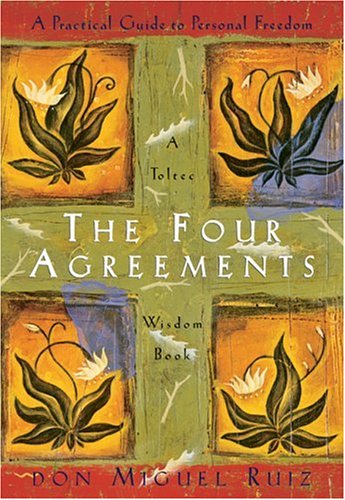The Four Agreements
One famous book you may have heard about is the Four Agreements by Don Miguel Ruiz, inspired by teachings from the ancient Toltec wisdom.
In summary, before I look at what they mean in our jobs, the Four Agreements are:
 1. Be Impeccable with your Word:
1. Be Impeccable with your Word:
Speak with integrity. Say only what you mean. Avoid using the Word to speak against yourself or to gossip about others. Use the power of your Word in the direction of truth and love.
2. Don’t Take Anything Personally
Nothing others do is because of you. What others say and do is a projection of their own reality, their own dream. When you are immune to the opinions and actions of others, you won’t be the victim of needless suffering.
3. Don’t Make Assumptions
Find the courage to ask questions and to express what you really want. Communicate with others as clearly as you can to avoid misunderstandings, sadness and drama. With just this one agreement, you can completely transform your life.
4. Always Do Your Best
Your best is going to change from moment to moment; it will be different when you are healthy as opposed to sick. Under any circumstance, simply do your best, and you will avoid self-judgment, self-abuse, and regret.
What I always liked about the four agreements is how simple, yet powerful and effective they are. Yet, difficult to stick to , I have to admit!
In our corporate world, there are absolutely no reasons why they should not be as effective and important as in other aspects of our lives. Imagine how transformed could be our workplaces if the Four agreements were to be used, or even taught to managers!
1. Be Impeccable with your Word
This has to do with how we use our energy. Imagine we are all given at the beginning of each day a given amount of energy to spend during the day. And our words and actions tap into that reservoir. Would you like to spend that precious energy blaming other colleagues, other teams or your boss? Or instead, would you like to use that energy taking full responsibility for what you can control and influence? And find ways to resolve conflicts of interests in constructive ways?
2. Don’t Take Anything Personally
I have to say that that particular agreement might be particularly challenging (well, others are as well ) It is particularly challenging because there is one additional dimension you’ll find in the corporate world, and that is hierarchy. Although it is difficult (at work or else) not to be affected by the opinion of others generally speaking, what about when those opinions and evaluations come from managers ?
And that comes down to the distinction it is important to make between the different roles we play in life (colleague, manager, wife/husband, parent, friend, …) and our identity. Not taking anything personally does not mean you do not listen to your boss anymore! But what is being said is said and respectfully heard in the context of that particular role (here, the boss and a team member). You (your identity) does not need be affected by what is being said.
3.Don’t Make Assumptions
And that is where Non Violent Communication tremendously help.
This agreement is about communicating openly, with authenticity and ultimately, courage. And as NVC teaches, once facts, feelings and needs have been clarified, clear communication should end with a clear ask. I would encourage you to read the blog post “NVC : how to give courageous feedback”, as it speaks about exactly that third agreement.
4. Always Do Your Best
The corporate world speaks a lot about excellence, and how to move from “good to great” while driving productivity up.
If one does not pay attention, one can easily fall into the trap of believing he is not doing enough.
Next, that too familiar inner voice starts to be heard, criticizing and blaming, like a gremlin sitting behind you! And before you know it, «burn-out» happens.
Coaching can help tremendously in two ways here.
First, gaining clarity about where that inner voice comes from and develop perspective about what we do.
Second, it helps us to redefine your «best». We sometimes think we have done our best, but the truth is, we have merely reproduced old habits of doing things. Coaching will expand our horizons and help us gain insight about new ways of doing things while developing new behaviors and capabilities.
Yes, this wisdom comes from ancient times, but to me, it is still pretty much needed in our workplaces!

Leave a Reply